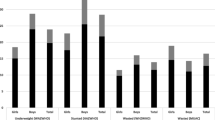Abstract
Objective
To assess the nutritional status of Palestinian children less than two years old and the associated risk factors.
Methods
The study was descriptive cross-sectional of 102 children attending the main four primary health care centers in the Gaza Strip during summer 2003. Data were collected through medical records and meeting interviews with children’s mothers by face to face. Questionnaire was subjected to validity and reliability procedures before being used. Descriptive analyses and cross tabulation were used.
Results
The study showed that the prevalence of anemia was 72.8% among children. Anthropometrical indices showed that the prevalence of wasting, stunting, underweight were 34.3%, 31.4%, 31.45% respectively.
Conclusion
Palestinian children are at high risk of health problems related to malnutrition. Informing Gazean families about the importance of following healthy dietary habits especially breastfeeding could improve child’s nutritional status in parallel with overcoming the devastating economic condition.
Similar content being viewed by others
References
United Nations Environmental Programs (UNEP). Desk study on the environment in the occupied Palestinian territories. UNEP- Palestinian National Authority, 2003.
The Palestinian Central Bureau of Statistics. Population in Palestinian Territory, 1997–2025, Ramallah-Palestinian National Authority, 1999.
Mahal A. The health care infrastructure and financing system in Palestine: implications for equity, efficiency and sustainability. Harvard Institute for International Development, USA, 1997.
WHO. Management of Severe Malnutrition: a manual for physicians and other senior health workers. WHO: Geneva, 1999. http://whqlibdoc.who.int/hq/1999/a57361.pdf
Brundtland GH. Nutrition, Health and Human Rights. WHO: Geneva, 2002. www.who.int/director-general/speeches/1999/english/19990412_nutrition.html
Ministry of Health. National Strategic Health Plan (1999–2003). Ministry of Health/Palestinian National Authority, 1999.
Denise FB, Bernadette PH. Essentials of nursing research; methods, appraisal, and utilization, 3rd ed. Philadelphia; J.B. Lippincott, USA, 1993.
WHO Expert Committee. Physical status: the use and interpretation of anthropometry. WHO Technical Reports Series, 854. WHO: Geneva, 1995.
Administrative Committee on Coordination, Subcommittee on Nutrition (ACC/SCN), United Nations. Third report on the world nutrition situation. Geneva: ACC/SCN, 1997.
WHO. The Management of Nutrition in Major Emergencies. WHO: Geneva, 2000.
Health Statistics in the West Bank and Gaza Strip. Current Status Report Series No 4. Ramallah. Palestinian Central Bureau of Statistics West Bank, 1995.
Liu F, Ma LJ, Yi MJ. Association of breastfeeding with behavioral problems and temperament development in children aged 4–5 years. Zhongguo Dang Dai Er Ke Za Zhi 2006; 8:334–337.
The Holy Qur’an. Sura 2 — Ayat 233: Al-Baqara (The Cow). 2007 http://www.islamicity.com/MOSQUE/ARABICSCRIPT/AYAT/2/2_233.htm
UNSCN (United Nations System Sub-Committee on Nutrition). 5th Report on the World Nutrition Situation: Nutrition for Improved Development Outcomes. New York. 2004.
Johns H, Al Quds Universities. Preliminary findings of the nutritional assessment and sentinel surveillance system For West Bank and Gaza. Care International, Gaza, Palestine, 2002.
Walter T. Effect of iron-deficiency anemia on cognitive skills and neuromaturation in infancy and childhood. Food Nutr Bull 2003;24:S104–S110.
al-Agha R, Teodorescu I. Intestinal parasites infestation and anemia in primary school children in Gaza Governorates— Palestine. Roum Arch Microbiol Immunol 2000;59:131–143.
Felicity SK, and Ann B. Nutrition for developing countries. 2nd edition. Great Britain, Oxford University. 1992.
Nelson W et al. Text book of Pediatrics. United States of America. 16th edition. United States of America, 2000.
Author information
Authors and Affiliations
Corresponding author
Rights and permissions
About this article
Cite this article
Radi, S., Mourad, T.A. & Papandreou, C. Nutritional status of Palestinian children attending primary health care centers in Gaza. Indian J Pediatr 76, 163–166 (2009). https://doi.org/10.1007/s12098-009-0046-9
Received:
Accepted:
Published:
Issue Date:
DOI: https://doi.org/10.1007/s12098-009-0046-9



